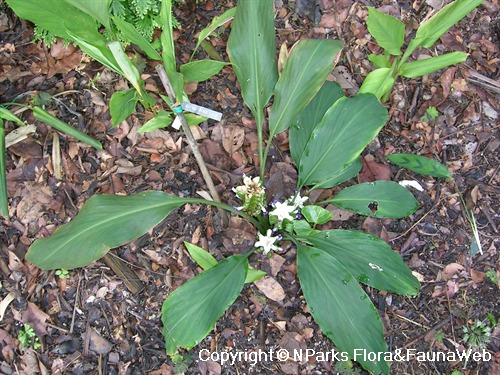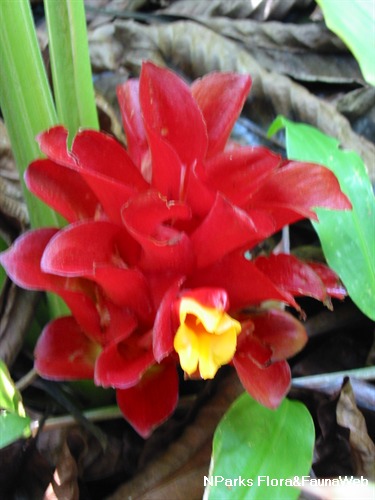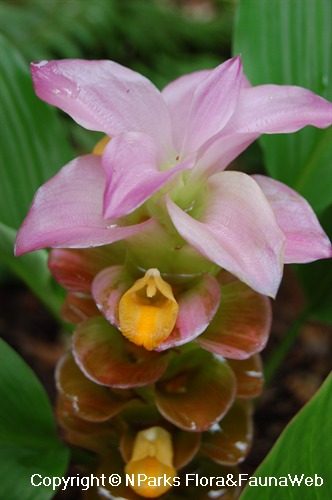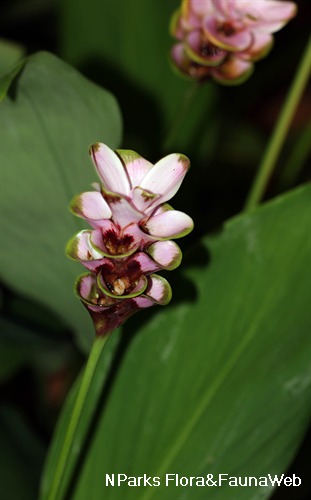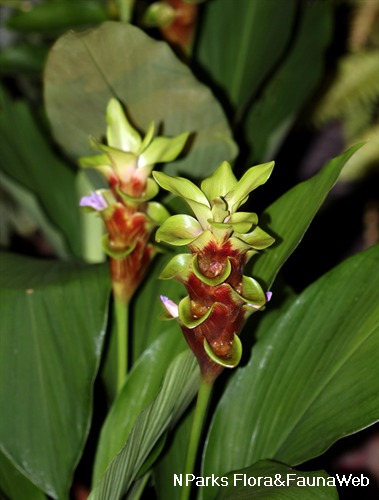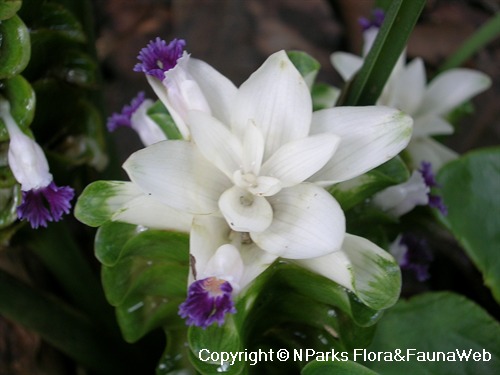
Back
Curcuma parviflora Wall.
| Family Name: | Zingiberaceae |
| Synonyms: | Hitcheniopsis parviflora (Wall.) Loes. |
| Common Name: | Theap Rum Ruk |
Name
Classifications and Characteristics
| Plant Division | Angiosperms (Flowering Seed Plants) (Monocotyledon) |
|---|---|
| Plant Growth Form | Herbaceous Plant |
| Lifespan (in Singapore) | Perennial |
| Mode of Nutrition | Autotrophic |
| Plant Shape | Columnar |
| Maximum Height | 30 cm to 50 cm |
Biogeography
| Native Distribution | Myanmar & Thailand |
|---|---|
| Native Habitat | Terrestrial (Monsoon Forest) |
| Preferred Climate Zone | Sub-Tropical / Monsoonal |
| Local Conservation Status | Non-native (Horticultural / Cultivated Only) |
Description and Ethnobotany
| Growth Form | Perennial herb up to 50 cm tall. |
|---|---|
| Foliage | Its long-stalked, green leaves are elliptic to oblong-lanceolate. |
| Stems | The plant grows from an underground, horizontal stem known as a rhizome. The aboveground, stem-like structures which emerge from the rhizome are known as pseudostems. |
| Flowers | Its inflorescence is erect, emerge between the leaves and is made up of many bracts. The upper bracts are white, whereas the lower bracts are green. The purplish flowers occur from the bracts. |
| Habitat | It often occurs on limestone hills and dry areas in deciduous forests and dry evergreen forests at 100 - 1300 m above sea level. |
| Cultivation | It grows best in moist, well-drained soil. |
| Etymology | The genus name Curcuma is derived from the Arabic “kurkum” or “kunkuma” for turmeric or its saffron-like colour. |
| Ethnobotanical Uses | Edible Plant Parts : Edible Flowers, Edible Leaves, Edible Stems Food (Fruit or Vegetable): Young leaves and flowers are eaten cooked, often with chilli. |
Landscaping Features
| Desirable Plant Features | Ornamental Flowers |
|---|---|
| Landscape Uses | Parks & Gardens, Container Planting, Small Gardens |
| Thematic Landscaping | Economic Garden |
Plant Care and Propagation
| Light Preference | Semi-Shade |
|---|---|
| Water Preference | Lots of Water |
| Plant Growth Rate | Moderate |
| Rootzone Tolerance | Moist Soils, Well-Drained Soils, Fertile Loamy Soils |
| Propagation Method | Division |
Foliar
| Mature Foliage Colour(s) | Green |
|---|---|
| Foliar Type | Simple / Unifoliate |
| Foliar Attachment to Stem | Petiolate |
| Foliar Shape(s) | Non-Palm Foliage (Ovate, Oblong) |
| Foliar Venation | Pinnate / Net |
| Foliar Apex - Tip | Acuminate |
| Foliar Base | Rounded / Obtuse |
| Typical Foliar Area | Macrophyll ( 182.25cm2 - 1640.25 cm2 ) |
| Leaf Area Index (LAI) for Green Plot Ratio | 3.5 (Shrub & Groundcover - Monocot) |
| Typical Foliar Size | 8 cm to 30 cm |
Non - Foliar and Storage
| Specialised Storage Organ(s) | Underground (Rhizome) |
|---|
Floral (Angiosperm)
| Flower Colour(s) | White, Purple |
|---|---|
| Flower Grouping | Cluster / Inflorescence |
| Flower Location | Terminal |
| Flower Symmetry | Bilateral |
| Individual Flower Shape | Tubular |
| Flower Size | 2 cm |
Fruit, Seed and Spore
| Fruit Classification | Simple Fruit |
|---|---|
| Fruit Type | Dehiscent Dry Fruit , Capsule |
References
| References | 33. Curcuma parviflora Wall. e-Flora of Thailand. https://botany.dnp.go.th/eflora/floraspecies.html?tdcode=08707 (Accessed 15 October 2025)
SirirugSa, P., LarSen, K. & MaKnoi, C. (2007). The Genus Curcuma L. ( Zingiberaceae ): Distribution and Classification with Reference to Species Diversity in Thailand. Gardens’ Bulletin Singapore 59 (1&2): 203-220. |
|---|
Image Repository
Others
| Master ID | 610 |
|---|---|
| Species ID | 1905 |
| Flora Disclaimer | The information in this website has been compiled from reliable sources, such as reference works on medicinal plants. It is not a substitute for medical advice or treatment and NParks does not purport to provide any medical advice. Readers should always consult his/her physician before using or consuming a plant for medicinal purposes. |

